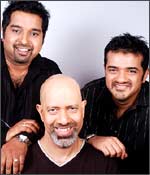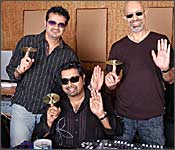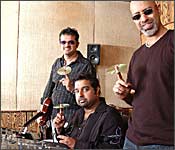|
|
| Help | |
| You are here: Rediff Home » India » Movies » Interviews » Shankar-Ehsaan-Loy |
|
 Shankar, Loy and Ehsaan | ||||
| Related Articles | ||||
|
•
The lady behind KANK's look
| ||||
| |||||||||||||||||||||||
|
| |||||||||||||||||||||||
They had been around for a while, but it was the fresh wind of Dil Chahta Hai [Images] that blew them to the forefront of the only music India really listens to -- the music of the Hindi film industry.
That guitar riff from the title track -- one of the first times in Bollywood that an electric guitar sounded the way it should -- of debutant director Farhan Akhtar's breakout movie starring Aamir Khan [Images], Saif Ali Khan [Images] and Akshaye Khanna [Images], sounded a bugle call: That music director trio Shankar Mahadevan [Images], Ehsaan Noorani and Loy Mendonsa, or Shankar-Ehsaan-Loy, had arrived.
They were unusual suspects: Ehsaan a blues-rock guitar player who studied at the Guitar Institute of Technology in Hollywood and who idolised the likes of fusion-blues guitar player Robben Ford; Shankar a classically trained singer; and Loy a keyboard player in love with jazz.
Now they are the usual suspects behind many a lilting soundtrack, from Bunty Aur Babli [Images] to Kal Ho Naa Ho to the newest Karan Johar [Images] mega movie, Kabhi Alvida Naa Kehna [Images].
Sumit Bhattacharya spoke to the trio, separately, to make a remix of their samples.
How do you compose music for a film?
Ehsaan: Well, we first hear the script. That is the starting point. We completely base our music on the script. The number of songs and the situations are given to us.
 Is there a Karan Johar style of music, as there is for films? Do you have to fit into that style?
Is there a Karan Johar style of music, as there is for films? Do you have to fit into that style?
Ehsaan: Obviously it's Karan's film, his vision. You can't expect him to respond to something, say, Farhan Akhtar would. And that is fine with us.
Shankar: Each director has his own preferences � what is the kind of music they connect to, what is the kind of music they listen to. And, of course, we have to fit into the script.
Loy: With Karan we have to be melodic. With Farhan, we can push the envelope in other directions. For Dil Chahta Hai, we went on a total tangent.
Is there pressure to dole out the same kind of songs that have been proven hits? For instance, Where's the party tonight (Kabhi Alvida Na Kehna) and It's the time to disco (Kal Ho Naa Ho), is there a trend there?
Ehsaan: I would like to differ. Yes, Where's the party tonight and It's the time to disco are both club songs, dance songs, but they are completely different. There was no pressure on us. Karan likes his English hooks, like we did for You are my Sonia (Kal Ho Naa Ho), and he responds to that.
Is there a thin line between having your own sound and being repetitive?
Ehsaan: For me, repetitive would mean repeating the same melody. You can't say a rock band is repetitive because they do rock songs, can you?
Shankar: Yes, there is a very thick line between being repetitive and having your own sound. You can always re-invent yourself -- think about the sounds you are using. I don't see any reason why you have to be repetitive if you have enough knowledge, enough exposure.
I don't think we have our own sound. There so many different kind of films we have done -- from Dil Chahta Hai to Bunty Aur Babli -- which have no connection. How can you have one sound? You can have a film like Omkara [Images], which is shot in Uttar Pradesh, and then a film shot in New York. There is no excuse for being repetitive.
Loy: You can fall into a trap both ways. All three of us write, so there's a lot of freshness; each album is distinct. We are a mini band. We have a lot of experience playing live. We can hold a gig on our own.
 Which soundtrack has been the most satisfying for you personally?
Which soundtrack has been the most satisfying for you personally?
Ehsaan: Dil Chahta Hai, because we could use a lot of our non-film influences, and because it established us as composers who are completely different.
Shankar: That's a very difficult question, because we have done so many songs and so many films. Some of them have been hits, some haven't. That doesn't mean you like them any less. But if you want one song it would be the title track of Kal Ho Naa Ho.
Loy: Dil Chahta Hai. No two ways about it.
We have seen quite a few Pakistani singers in Bollywood lately. You have also used them for Mitwa. Is there anything about Pakistani singers that sets them apart?
Shankar: A) Some of them are really good. B) They have a certain flavour, a certain spice -- because of the culture and the region -- that they bring to the songs. And that Urdu expression. You want that flavour in your songs sometimes.
How does a classical singer become part of a leading Bollywood composer trio?
Shankar: (Laughs) Classical music is a great advantage you have. Be it during composing or arranging, classical music is like grammar. So it always is an advantage. And I am doing my classical music in full swing with Shakti, with people like (tabla maestro) Zakir Hussain and (mandolin phenomenon) U Srinivas -- that's as classical as you can get.
I knew Ehsaan and Loy from the ad industry, before we became a trio. Mukul (Anand, director) brought us together for Dus (an unfinished movie that never saw light of day).
How does a blues guitar player become a Bollywood composer?
Ehsan: See, from a blues guitar player I became a studio guitar player. Then I became a jingle composer, and then I became a Bollywood composer. For me, it was the music that was important -- playing music as opposed to a desk job.
How does a keyboardist who loves jazz become a Bollywood composer?
Loy: I am passionate about jazz because it's a beautiful form of music based on improvisation, like Indian classical. I used to play with a pop-funk-blues band and a play for jingles. I did a lot of television in the formative years of Indian television. In fact, I even did the music for Shah Rukh Khan's [Images] first television serial, Fauji.
Our varied influences were perfect for Bollywood because till then there were a couple of fixed things and people were beating them to death. Like when R D (Burman) came, he was a pioneer, he brought in world music, then Rahman. And after Rahman, us. And people were blown away, because it was completely fresh.
The sound of Bollywood has changed from the screeching violins to sophisticated string arrangements.
Loy: The screeching sound was because of the violins being out of tune! We have just a handful of violin players. Imagine, we still don't have a national orchestra. With technology, there is a level playing field.
Your Western influences show even in the very Indian tracks you make.
Ehsaan: I don't think we should even talk about Western or Indian influences. Music has taken a different turn now. A lot of times we have been panned for being too Western. I would say we have eclectic influences, as opposed to Western or Indian. For me, even Kajra Re (Bunty Aur Babli) is very Western, because of the arrangement behind the song.
Tell us about Shah Rukh Khan singing in Farhan Akhtar's Don remake.
Loy: There are quite a few surprises. We don't want to give anything away.
|
|
| © 2008 Rediff.com India Limited. All Rights Reserved. Disclaimer | Feedback |